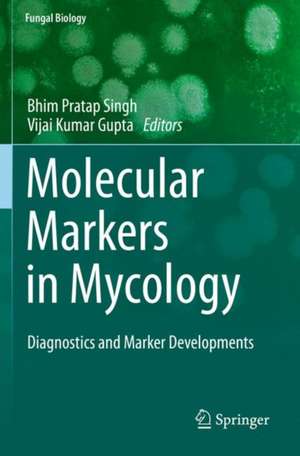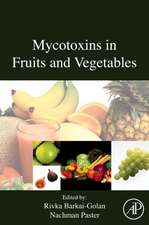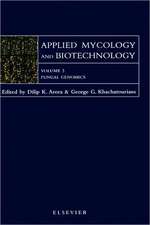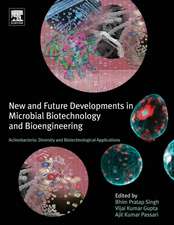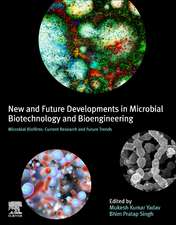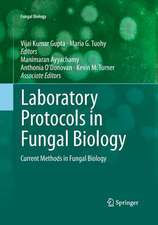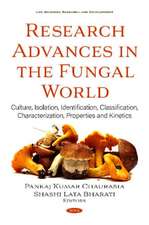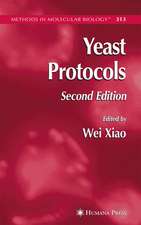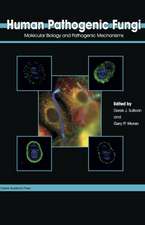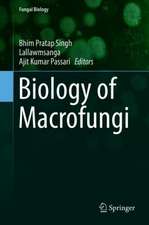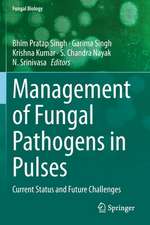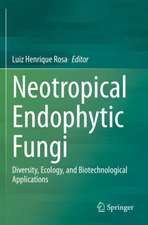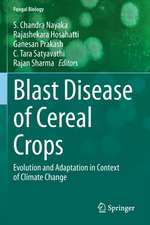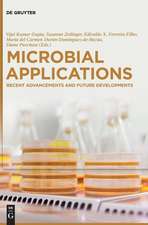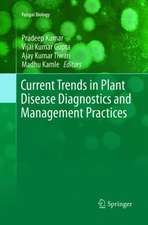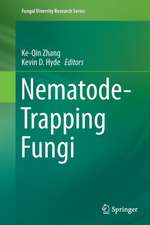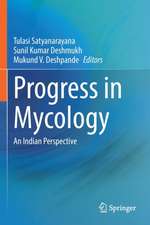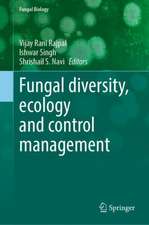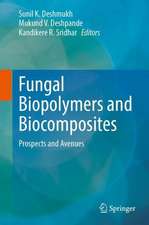Molecular Markers in Mycology: Diagnostics and Marker Developments: Fungal Biology
Editat de Bhim Pratap Singh, Vijai Kumar Guptaen Limba Engleză Paperback – 12 iul 2018
| Toate formatele și edițiile | Preț | Express |
|---|---|---|
| Paperback (1) | 840.48 lei 38-44 zile | |
| Springer International Publishing – 12 iul 2018 | 840.48 lei 38-44 zile | |
| Hardback (1) | 1122.72 lei 22-36 zile | |
| Springer International Publishing – 13 feb 2017 | 1122.72 lei 22-36 zile |
Din seria Fungal Biology
- 18%
 Preț: 1122.72 lei
Preț: 1122.72 lei - 15%
 Preț: 658.22 lei
Preț: 658.22 lei - 18%
 Preț: 1110.72 lei
Preț: 1110.72 lei - 20%
 Preț: 544.50 lei
Preț: 544.50 lei - 18%
 Preț: 948.61 lei
Preț: 948.61 lei - 18%
 Preț: 960.42 lei
Preț: 960.42 lei - 24%
 Preț: 1074.50 lei
Preț: 1074.50 lei - 18%
 Preț: 1228.96 lei
Preț: 1228.96 lei - 15%
 Preț: 635.01 lei
Preț: 635.01 lei - 18%
 Preț: 1403.98 lei
Preț: 1403.98 lei - 18%
 Preț: 1117.99 lei
Preț: 1117.99 lei - 15%
 Preț: 657.57 lei
Preț: 657.57 lei - 18%
 Preț: 958.88 lei
Preț: 958.88 lei - 18%
 Preț: 951.77 lei
Preț: 951.77 lei - 18%
 Preț: 957.75 lei
Preț: 957.75 lei - 18%
 Preț: 1112.15 lei
Preț: 1112.15 lei - 18%
 Preț: 998.34 lei
Preț: 998.34 lei - 18%
 Preț: 954.93 lei
Preț: 954.93 lei - 18%
 Preț: 1117.99 lei
Preț: 1117.99 lei - 18%
 Preț: 1120.18 lei
Preț: 1120.18 lei - 15%
 Preț: 643.34 lei
Preț: 643.34 lei - 15%
 Preț: 640.71 lei
Preț: 640.71 lei - 18%
 Preț: 951.14 lei
Preț: 951.14 lei - 18%
 Preț: 948.92 lei
Preț: 948.92 lei - 15%
 Preț: 644.95 lei
Preț: 644.95 lei - 18%
 Preț: 1844.67 lei
Preț: 1844.67 lei - 18%
 Preț: 947.67 lei
Preț: 947.67 lei - 18%
 Preț: 1111.67 lei
Preț: 1111.67 lei - 18%
 Preț: 1010.65 lei
Preț: 1010.65 lei - 18%
 Preț: 953.35 lei
Preț: 953.35 lei - 18%
 Preț: 959.19 lei
Preț: 959.19 lei - 15%
 Preț: 645.28 lei
Preț: 645.28 lei
Preț: 840.48 lei
Preț vechi: 1105.90 lei
-24% Nou
Puncte Express: 1261
Preț estimativ în valută:
160.88€ • 174.81$ • 135.22£
160.88€ • 174.81$ • 135.22£
Carte tipărită la comandă
Livrare economică 16-22 aprilie
Preluare comenzi: 021 569.72.76
Specificații
ISBN-13: 9783319816784
ISBN-10: 3319816780
Pagini: 361
Ilustrații: XIII, 361 p. 61 illus., 50 illus. in color.
Dimensiuni: 155 x 235 mm
Ediția:Softcover reprint of the original 1st ed. 2017
Editura: Springer International Publishing
Colecția Springer
Seria Fungal Biology
Locul publicării:Cham, Switzerland
ISBN-10: 3319816780
Pagini: 361
Ilustrații: XIII, 361 p. 61 illus., 50 illus. in color.
Dimensiuni: 155 x 235 mm
Ediția:Softcover reprint of the original 1st ed. 2017
Editura: Springer International Publishing
Colecția Springer
Seria Fungal Biology
Locul publicării:Cham, Switzerland
Cuprins
1. Molecular Diversity and Detection of Endophytic Fungi Based on Their Antimicrobial Biosynthetic Genes.- 2. Molecular Markers and Their Use in Taxonomic Characterization of Trichoderma spp.- 3. Molecular Diversity of Oleaginous Fungi from Virgin Soils and Their Potentiality of Biodiesel Production.- 4. Application of Real-Time PCR for Identification and Detection of Fungi.- 5. DNA Bar-Coding for Diagnostics and Monitoring of Plant Pathogens.- 6. New Generation DNA Markers for Fingerprinting and Structural Analysis of Fungal Community.- 7. Genic Markers in fungi: Availability and Utility for diagnostics.- 8. Molecular Markers for the Identification of Arbuscular Mycorrhizal Fungi (AMF) in the Soil and Plant Roots.- 9.Edible Mushroom Species: Identification Through Molecular Markers.- 10. Detection and Management of Fungal Respiratory Infection by Using Molecular Markers.- 11. Mitochondrial DNA Based Molecular Marker in Arbuscular Mycorrhizal Fungi (AMF) Research.- 12. Taxonomic Updates with Key Focus on Medically Important Aspergilli.- 13. Current Approach Towards Development of Molecular Markers in Diagnostics of Invasive Aspergillosis.- 14. An Overview of Major Fungal Diseases of Sugarcane in India: Detection and Management Strategies.- 15. Assessing Fungal Diversity by Using Molecular Markers.- 16. Detection of Multi Drug Resistant Fungal Infections in Cancer Patients by Using Molecular Markers.
Notă biografică
Dr. Bhim Pratap Singh Assistant Professor Mizoram University, India Department of Biotechnology Aizawl, Mizoram 796004 India Dr. Vijai Kumar Gupta Lead Researcher National University of Ireland Galway School of Natural Sciences Molecular Glyco-biotechnology Group Department of Biochemistry Galway City, Ireland
Textul de pe ultima copertă
The Kingdom fungi encompass a massive diversity of taxa with wide-ranging ecologies, life cycles, and morphologies ranging from unicellular aquatic chytrids to large mushrooms. Before molecular methods came in existence, taxonomists considered this Kingdom to be a member of the plant kingdom due to certain life styles like immobility and growth habitats. Molecular markers (also known as DNA markers), facilitated a better alternative method over traditional morphological methods, employed for the identification, characterization, and to understand the evolution of fungi. The morphological methods used for identification are mainly dependent on spore color or microscopic features whereas molecular markers are based on DNA polymorphism in the genomic organization. Phylogenetic studies reported in last decade, based on molecular markers, have reshaped the classification system of Kingdom fungi, which divided into one subkingdom, seven phyla, and ten subphyla. Recent advances in molecular mycology have opened the way for researchers to identify and characterize novel fungal species from unique environments. Mycology is concerned with the systematic study of fungi, including their genetic and biochemical properties, their use to humans as a source of medicine and food, as well as their dangers, such as poisoning and infections. In the 21st century with the development of DNA sequencing technologies and phylogenetic analysis based on molecular markers, new insights into fungal taxonomy were provided. This book contains a thorough discussion of molecular characterization and detection of different groups of fungi by using PCR-based markers and provides a comprehensive view of the applications and uses of different molecular markers in molecular mycology. It also addresses the recent molecular markers employed to solve the problems of identification and discusses current approaches used in molecular characterization and detection of fungi.
Caracteristici
Provides a comprehensive view of the applications and uses of different molecular markers in molecular mycology Addresses the recent molecular markers employed to solve the present problems of identification and discuss current approaches used in molecular characterization and detection of fungi Addresses topics on molecular characterization and detection of different groups of fungi by using PCR based markers
